
PREV ARTICLE
NEXT ARTICLE
FULL ISSUE
PREV FULL ISSUE
WORLD WAR I COMMEMORATIVE SCULPTOR LEROY TRANSFIELDHere's an article about the designer of the new U.s. Mint World War I commemorative coin. -Editor
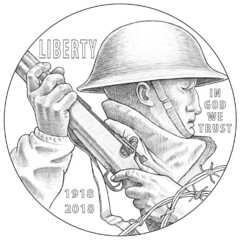 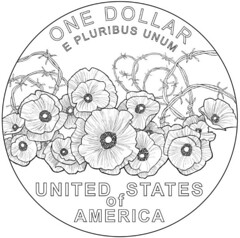 The most common mistake beginners make, contest officials told LeRoy Transfield, is adding too much detail. So the Orem sculptor meticulously planned every detail of his 8-inch plaster masterpiece: a soldier with a crooked nose clutching a rifle, poppies blooming amid twisted barbed wire, and the words "In God We Trust" square to the soldier's face. After several weeks of work, Transfield's finishing artwork was chosen as the winning design for the 2018 World War I American Veterans Centennial silver dollar. "It was really hard to come up with a design," he said, "but in the end, I came up with something I was really happy with. When I sent it off, I didn’t know if it was going to do well or not, but at least it was something I could put my name on." Although he's never sculpted a coin before, Transfield said U.S. Mint officials unanimously voted for his design among 20 other finalists. The final retail product is only 1 ½ inches wide, featuring Transfield's artwork on both sides of the coin. The commemorative silver dollar will be released in January, marking the 100th anniversary of the end of World War I. The U.S. Mint plans to strike 400,000 silver coins with Transfield's design. Art for the front of the coin, "Soldier’s Charge," came easily, Transfield said. After trying a few designs, he decided to feature the profile of a soldier. "I didn’t want him to look like some model in an artist’s studio," Transfield said. "I made his nose like it might’ve been broken. I wanted to give him a rugged looking face. … I wanted that feeling of combat." Next he added the rifle and the barbed wire, as well as placing the phrases "Liberty" and the years 1918 and 2018. He also carefully placed the words "In God We Trust" directly in front of the soldier's face. "He's going right into battle, so I liked having the lettering there," Transfield explained. "When I did that, I could tell that’s it; that’s the front." The flip side, "Poppies in the Wire," came slowly. The sculptor tried using images of an eagle or a carrier pigeon, but none of the designs fit. As the deadline neared, Transfield finally settled on the picture of poppies growing among the barbed wire. Both images are common wartime symbols. When the U.S. Mint approved the design, official artists tweaked the art slightly, adding shading details and making the rifle more accurate for the time period. "They said, ‘Don’t worry that you don’t know how to make a coin. We just want your ideas,'" Transfield said. Transfield said he started sculpting as he was a teenager living in New Zealand. After graduating from BYU-Hawaii with bachelor's degree in fine arts, he and his wife moved to Orem, where he operates a sculpting studio out of his garage. "This is the first time I've had an attempt at a coin, and I'm surprised that I won," he said. "To be able to make a contribution in my own artistic hand, it's great." 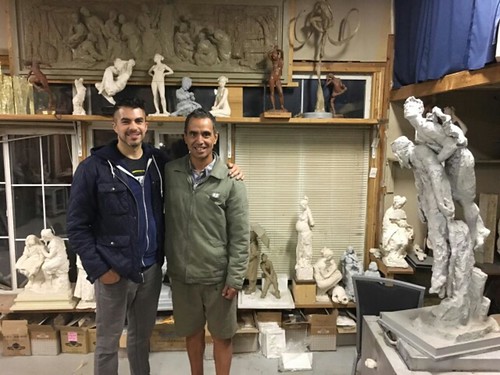 Utah sculptor LeRoy Transfield, right, poses in his sculpting studio in Orem To read the complete article, see: Here's a video interview fom a local TV station. -Editor
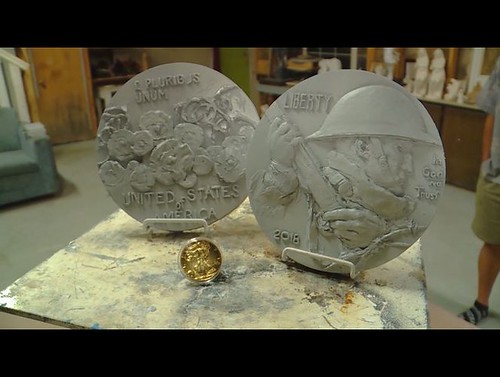 To read the complete article, see: 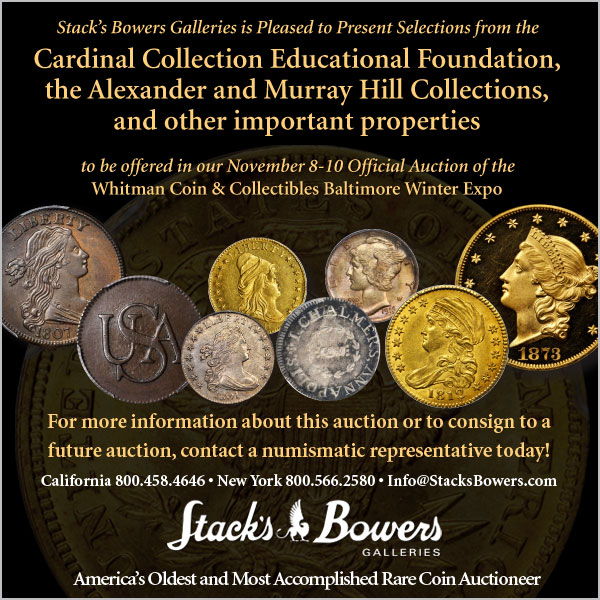 Wayne Homren, Editor The Numismatic Bibliomania Society is a non-profit organization promoting numismatic literature. See our web site at coinbooks.org. To submit items for publication in The E-Sylum, write to the Editor at this address: whomren@gmail.com To subscribe go to: https://my.binhost.com/lists/listinfo/esylum All Rights Reserved. NBS Home Page Contact the NBS webmaster 
|